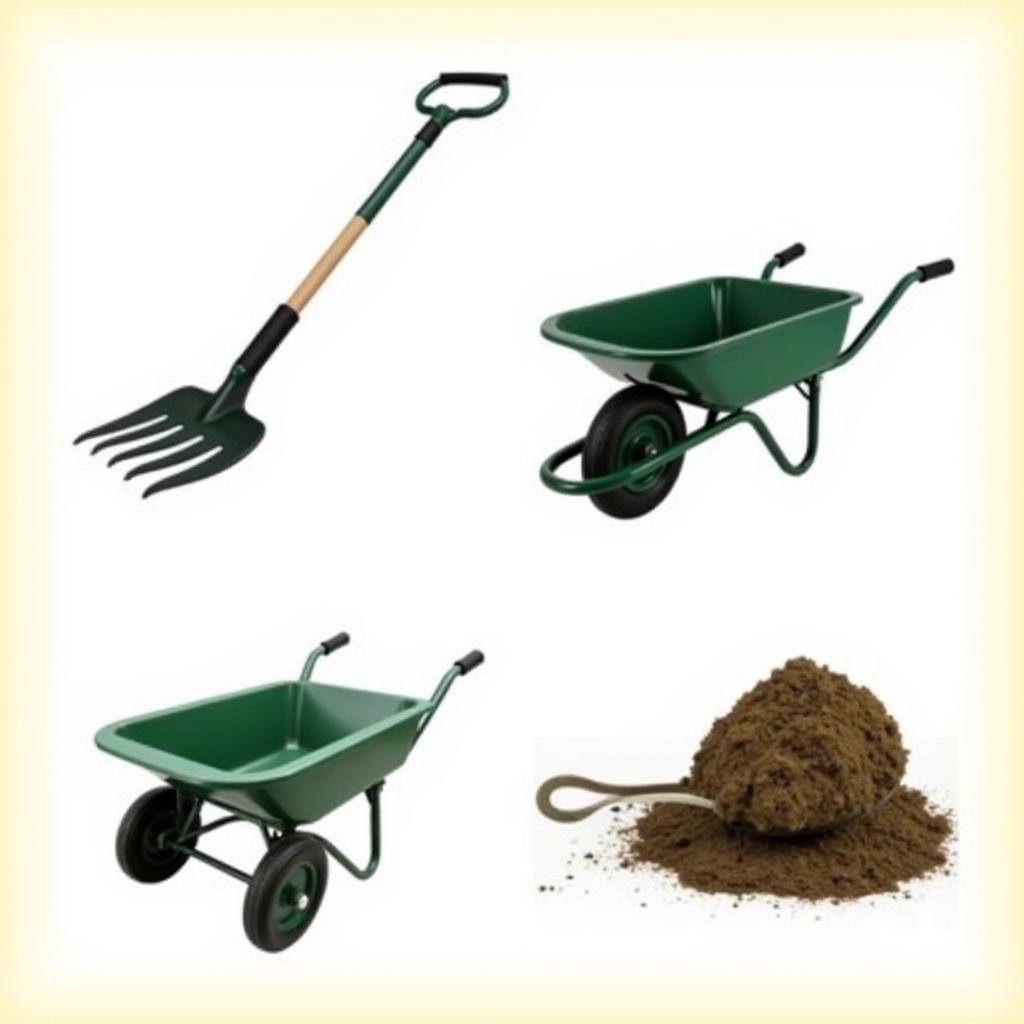Picking up horse manure is a crucial aspect of horse ownership. It’s not just about aesthetics; it’s vital for your horse’s health, pasture management, and overall farm hygiene. This comprehensive guide will delve into the best practices, tools, and strategies for efficient and effective manure management.
 Essential Tools for Picking Up Horse Manure
Essential Tools for Picking Up Horse Manure
Why is Picking Up Horse Manure Important?
Regularly picking up horse manure is essential for several reasons:
- Parasite Control: Horse manure can harbor internal parasites that can re-infect your horses. Removing manure breaks the parasite life cycle, reducing the risk of infestation.
- Pasture Health: Accumulated manure can smother grass, creating bare patches and encouraging weed growth. Removing it allows for even fertilization and healthy pasture growth.
- Fly Control: Horse manure attracts flies, which can be a nuisance and spread diseases. Regular manure removal minimizes fly breeding grounds.
- Aesthetics: A clean and well-maintained pasture is simply more pleasant to look at! It creates a healthier and more inviting environment for both horses and people.
Remember, investing in the right essential horse supplies can make manure management much easier.
Essential Tools for Picking Up Horse Manure
Having the right tools makes the job easier and more efficient. Here are some must-haves:
- Manure Fork: A sturdy manure fork with appropriately spaced tines is essential for separating manure from bedding or soil.
- Shovel: A shovel is useful for picking up loose manure and cleaning stalls.
- Wheelbarrow or Muck Bucket: These are essential for transporting the collected manure. Consider a two-wheeled wheelbarrow for easier maneuvering on uneven terrain.
- Gloves: Protect your hands from bacteria and parasites by wearing durable gloves.
- Broom and Dustpan: For cleaning up small amounts of manure in areas like barn aisles.
A good horse salt lick holder can also contribute to a cleaner pasture, as it prevents salt from being scattered on the ground and mixed with manure.
How to Pick Up Horse Manure Effectively
Follow these steps for effective manure removal:
- Establish a Routine: Pick up manure at least twice a week, or more frequently in heavily used areas.
- Use the Right Technique: Use the manure fork to lift and shake the manure, allowing excess bedding or soil to fall through.
- Dispose of Manure Properly: Compost the manure or dispose of it according to local regulations. Avoid piling it near water sources.
- Clean and Disinfect Tools: Regularly clean and disinfect your tools to prevent the spread of bacteria and parasites.
“Regular manure removal is the cornerstone of good horsekeeping,” says Dr. Emily Carter, DVM, an equine veterinarian with over 20 years of experience. “It’s a simple task that has significant implications for your horse’s health and well-being.”
How Often Should You Pick Up Horse Manure?
The frequency of manure removal depends on several factors, including the number of horses, the size of the pasture, and the climate. Generally, picking up manure two to three times a week is sufficient for most pastures. Smaller paddocks or areas with high horse traffic might require daily cleaning.
What to Do with Collected Horse Manure
Composting is an excellent way to recycle horse manure. It breaks down the manure into a valuable fertilizer for your garden or pasture. Make sure your compost pile is properly maintained to prevent odors and fly breeding.
Proper hydration is essential for horses, especially those on pasture. Providing convenient water bucket holders for horses can ensure your horses always have access to fresh water.
Conclusion
Picking up horse manure is a fundamental task for every horse owner. By following these guidelines and investing in the right tools, you can maintain a healthy and enjoyable environment for your horses. Remember, regular manure management contributes significantly to parasite control, pasture health, and overall farm hygiene. Picking up horse manure is not just a chore; it’s an investment in your horse’s well-being.
FAQ
- What is the best tool for picking up horse manure? A manure fork is generally the most effective tool.
- Can I use horse manure as fertilizer? Yes, composted horse manure is an excellent fertilizer.
- How often should I clean my horse’s stall? Daily cleaning is recommended for stalls.
- Why is it important to remove manure from pastures? It helps prevent parasite infestations and promotes pasture health.
- What is the best way to dispose of horse manure? Composting is a sustainable and beneficial method.
- How can I reduce flies in my barn? Regular manure removal is key to fly control.
- What are the signs of a parasite infestation in horses? Signs can include weight loss, diarrhea, and a dull coat.
“Consistent manure management is a sign of a responsible horse owner,” says John Miller, a renowned farrier with over 30 years of experience. “It demonstrates a commitment to the horse’s health and the overall well-being of the farm.”
If you’re planning a horseback riding adventure, check out our guide on horse camping colorado for helpful tips and recommendations. While enjoying your horse, you may want to learn more about horse footjob.
For any assistance, please contact us at Phone Number: 0772127271, Email: [email protected] or visit our address: QGM2+WX2, Vị Trung, Vị Thuỷ, Hậu Giang, Việt Nam. We have a 24/7 customer service team.